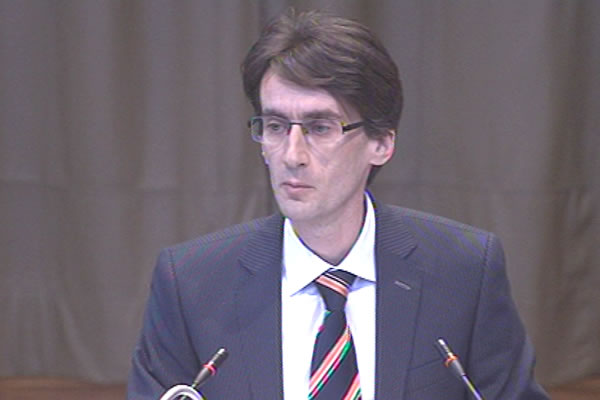Home
SERBIA: GENOCIDE AGAINST SERBS, NOT CROATS
As he responded to Croatia's arguments, head of the Serbian legal team Sasa Obradovic admitted that grave crimes had been committed in Croatia. However, Obradovic stressed, there was no evidence that they ‘reached the scale of genocide’. On the other hand, the crimes against Serbs in Operation Storm contained all the elements of genocide, including the specific intent, noted Obradovic
 Sasa Obradovic, head of the Serbian legal team
Sasa Obradovic, head of the Serbian legal team In response to Croatia’s accusations of the violation of the Convention for the Prevention and Punishment of the Crime of Genocide, head of the Serbian legal team Sasa Obradovic agreed that grave crimes had been committed in Croatia. However, Obradovic noted that their gravity didn’t reach the threshold necessary to qualify them as genocide. Obradovic also expressed ‘sympathy for the victims’ regardless of the legal qualification of the crimes.
This week Serbia will respond to Croatia's allegations that the JNA, the Territorial Defense, the paramilitaries, volunteers and other Serbian formations during the war acted with the intent to ‘destroy in part or as a whole the Croatian population’ in Eastern and Western Slavonia, Banija, Kordun and Dalmatia. The accusations contained in the legal suit filed in July 1999 were ‘serious’, Obranodovic said, but there was ‘no evidence to support them’. According to Obradovic, Croatia has not produced a single piece of evidence, a witness or a document proving the genocidal intent of the Serbian leadership, the JNA or Serbs from Croatia. Even if the evidence presented by Croatia were accepted as credible, it does not meet the legal requirements for the crime of genocide, Obradovic argued.
Obradovic reiterated that Belgrade couldn’t be responsible for the acts and omissions committed before 27 April 1992 when the Federal Republic of Yugoslavia formally came into existence. Most of the crimes Serbia is accused of were committed in 1991, Obradovic explained. The handful of crimes committed after April 1992 couldn’t be qualified as genocide. Finally, Obradovic argued that those who committed the crimes in Croatia were not Serbian agents, either de jure or de facto. The Tribunal’s recent judgments also show that the crimes were not committed on the orders or under the control of Serbia, Obradovic added.
In the introductory part of the counter-claim that Serbia filed against Croatia in January 2010 Obradovic emphasized that the ‘mass murders during and after Operation Storm reached the scale of genocide’. According to the information provided by the Veritas Documentation Center, almost 6,400 Serbs were killed in the war in Croatia. Of that, about 1,700 Serbs were killed during Operation Storm. About 1,700 are still missing and 400 exhumed bodies have yet to be identified. In October 1995, the UN Secretary General stated that about 200,000 Krajina Serbs had fled the Croatian territory after Operation Storm in August 1995.
After Obradovic completed his presentation, international law professor William Schabas took the floor. He spoke about the different interpretations of the Genocide Convention in the light of the 2007 judgment of the International Court of Justice in Bosnia and Herzegovina’s genocide suit against Serbia. As Professor Schabas noted, the Tribunal has already adjudicated many of the aspects of the Croatia vs. Serbia case. The International Court of Justice, unlike the Tribunal, does not have jurisdiction over war crimes and crimes against humanity, and this fact must be borne in mind, Professor Schabas added. He quoted the relevant judgments of the European Court of Human Rights, the Tribunal for Rwanda, the decisions of the International Criminal Court and some of the Tribunal’s judgments pertaining to the acts of genocide and the intent to ‘destroy a group’.
In the final part of the presentation, Sasa Obradovic, head of the Serbian legal team, contested the evidence called by Croatia. Obradovic claimed that the evidence was ‘based on unsigned statements’ drafted by the Croatian police and the court couldn’t rely on them. This evidence served to ‘vilify Serbs on the grounds of fabricated and false documents’, Obradovic noted. According to Obradovic, Croatia submitted 209 such statements; 189 of them were not signed.
The public hearing continues tomorrow when Belgrade will present its argument on the jurisdiction of the court and the merits of the Croatian and Serbian cases.
Linked Reports
- Case : Croatia vs. Serbia
- 2014-03-07 IS THERE EVIDENCE OF SERBIA’S ‘GENOCIDAL INTENT’?
- 2014-03-06 CROATIA: SERBIA RESPONSIBLE FOR CRIMES COMMITTED BY JNA AND SERBIAN TROOPS
- 2014-03-05 PATTERN OF ATTACK AND ‘CLEAR INTENT TO DESTROY’
- 2014-03-11 CAN GENOCIDE CONVENTION APPLY TO WORLD WAR I?
- 2014-03-12 SERBIA: CRIME OF ALL CRIMES WAS NOT COMMITTED
- 2014-03-12 BRIONI TRANSCRIPTS AS EVIDENCE OF GENOCIDAL INTENT
